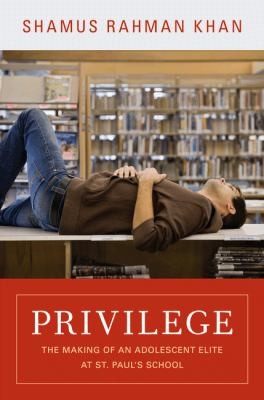Privilege

Privilege is an in depth study of St. Paul’s boarding school in the Northeast, the same high school he attended back in the 90s, as part of a sociology study on the making of a new type of American elite. What characterizes the new elite is privilege, a set of skills and experiences that helps students navigate social hierarchies with ease. Privilege is how elites pass down advantages in an open but unequal world. For Khan, privilege is primarily cultural; only the last chapter is devoted to academics. Instead, he spends the majority of time examining the dynamics of this little society and the influence of class, race, and gender on them. Much of it is conventional high school drama: dress, dating, and dances. The gender dynamics Khan describes exist in most American high schools, heightened perhaps by the cloistered environment of the boarding school. Much of the dynamics are specific to an elite institution. Many students from non-elite backgrounds are forced to rationalize their experience of the school.
By the end of the book, I feel that I have a good understanding of how St. Paul worked in the 2000s, but not how it relates to the larger story of inequality. Inequality in the US has been rising since the 1970s despite the opening of elite institutions. Is privilege why the top 1% have accumulated an increasing share of American wealth? Is the lack of privilege why the median household income hasn’t improved since 1980? Even when elite institutions were closed off in the first half of the twentieth century, wages and living standards for the Average Joe were rising. The decoupling of wages from productivity improvements is a major chapter in the story of inequality. Of course, this is beyond the scope of a single book or even sociology. What Privilege does make clear is how the game of meritocracy—supposedly fair and open to all—is in fact rigged towards the children of existing elites, and how those from non-traditional backgrounds still don’t fit in.